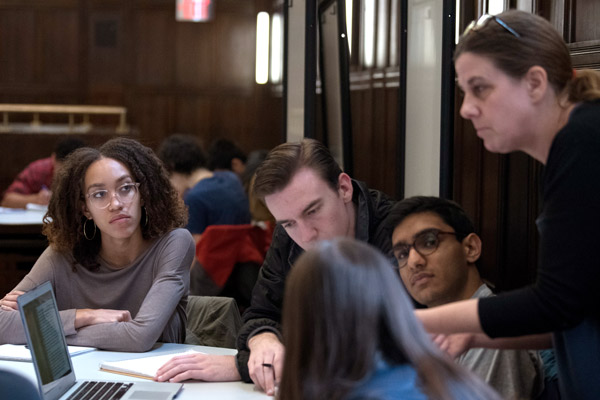The University’s First-Year Seminars (formerly called Freshman Seminars), offered through Penn Arts and Sciences, provide incoming students with an opportunity to immerse themselves in a particular field of study in a small group setting. The seminars help students to fulfill Penn’s general education requirement, make connections with faculty, build a foundation of knowledge, and get a feel for academic life.
Penn offers dozens of seminars for first-year students, the majority of which take place during the fall semester. Most of the faculty who teach these courses come from Arts and Sciences, but some hold joint posts or teach in another of the University’s twelve schools, including the Perelman School of Medicine, the School of Social Policy and Practice, and the School of Design.
“First-Year Seminars provide new undergraduates with opportunities for in-depth exploration of diverse subjects through discussion and interaction in small groups with some of our most outstanding professors, and provide rewarding moments in the classroom for our faculty,” says Paul Sniegowski, Stephen A. Levin Family Dean of the College of Arts and Sciences and Professor of Biology. “Students get to know each other and their professor well in these small seminars, forming friendships and academic relationships that last beyond the semester.”
This fall’s roster of 43 seminars explore everything from Epidemic Diseases in Modern History to Ancient Chinese Ethics. The Department of Mathematics’ seminar, Proving Things, focuses on the creative side of mathematics. Course content alternates between Proving Things: Analysis, offered each fall, and Proving Things: Algebra, taught in the spring. The seminars emphasize discovery and reasoning while also highlighting the importance of effectively communicating mathematical ideas. In this fall’s Analysis seminar, taught by Professor of Mathematics Jerry Kazdan, students work together to study real and complex numbers, sequences, and series.
With its interdisciplinary approach and emphasis on collaborative research on the environment, the Penn Program in Environmental Humanities is a natural fit for First-Year Seminars. Associate Professor of Architecture Daniel A. Barber, of the School of Design, is part of the PPEH faculty working group. His fall seminar, Architecture in the Anthropocene, uses architecture and the built environment as a lens to introduce students to the environmental humanities. The course examines the relationship between global environmental challenges and the process of constructing the built environment. Using social and political theory, environmental history, and architectural history and theory, students consider theories of risk; the role of nature in political conflicts; images, design, and environmental communication; and the relationship between speculative design and other narratives of the future.
Contemporary fiction provides another avenue for exploring environmental humanities. Paul Saint-Amour, Walter H. and Leonore C. Annenberg Professor in the Humanities in the English department, leads a seminar called Climate Fiction, which looks at “cli-fi,” or speculative fiction about climate change. Readings include cli-fi novels, such as Barbara Kingsolver’s Flight Behavior and Kim Stanley Robinson’s New York 2140, which project possible future climate scenarios from the apocalyptic to the utopian. The class also covers earlier fiction that looks at humanity’s entanglement with non-human beings and environments.
“Climate Fiction with Paul is currently my favorite course at Penn,” says Sophia Zhu, C’22. “The small-group discussions we have every day really let us get to the heart of these perspectives. Sometimes we’ll focus on one tiny aspect, like the metaphorical purpose of a walled community in a post-carbon world—this is from Octavia Butler’s Parable of the Sower—or we’ll talk about the issue of scaling in Kim Stanley Robinson’s New York 2140, which goes from particular moments of individual characters to describing the impacts of global weather patterns.
“I think it emulates the kind of dialogue we should be having about climate change,” Zhu continues. “It’s multifaceted, and how we choose to fit these pieces together in class is definitely a thought-provoking experience, both within the boundaries of our academic discussion and in terms of how I fit into the world.”
Sniegowski says that a main benefit of First-Year Seminars is their ability to help students discover how they fit into the world. “In many cases, these seminars open new ideas for students about what major to pursue or what area of research to get involved in.”



